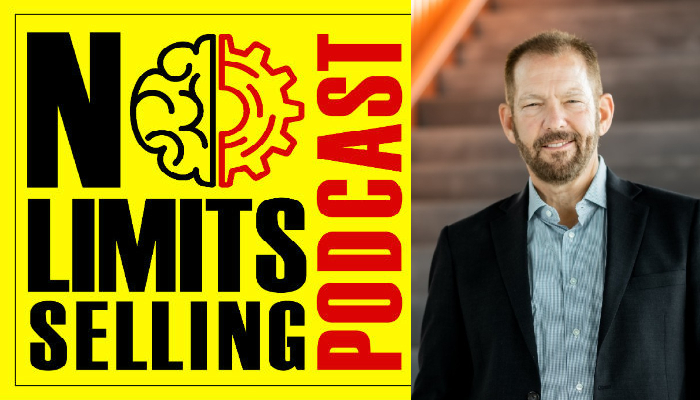Jim Allen on Simplicity on the Other Side of Complexity
On Episode 100 of The No Limits Selling Podcast, we have Jim Allen, President at The Jim Allen Group. In Jim's world, his client is the most important person and he has built this organization, The Jim Allen Group, on that premise.
A degree in Engineering has been especially beneficial in his real estate success story. The first real estate position was with a firm very strong in new construction as well as resale homes. Working with the finest custom home builders in the Triangle, the knowledge he has acquired is unequaled. His first year was one of great strides and he soon became a sales leader in the firm.
In January 2009, Jim transitioned his business to Coldwell Banker Howard Perry and Walston. During his first few months, he won numerous awards including the International President's Premier Award. This prestigious award is the highest honor a Coldwell Banker agent can receive and is presented to less than one percent of sales associates globally. Jim has also been honored with the following awards during his time with Coldwell Banker: Mega Listing Team of the Year, Mega Volume Leader Team of the Year, Mega Sales Team of the Year, and Mega Team of the Year. The Jim Allen Group is the #1 Coldwell Banker Team in both sales volume and units sold!
Jim attributes his success to a continuing commitment to the marketing and selling of new construction and the dedication of his support team - all personally selected and trained by Jim. The team has over 700 years of combined experience.
The real estate business affords all the challenges needed to hold Jim's interest. You can expect the most the Triangle's real estate market has to offer with Jim on your side.

Contact Jim:
[EDITOR’S NOTE: This podcast is sponsored by No Limits Selling. It is a fun, fast-paced podcast that delivers hard-fought business advice that you can implement today to improve your sales and performance]
Interested In Our Real Estate Coaching Services? Explore Our Website: Link
Feeling Not Well Today? You Can Use Our Mindset Boosters App To amp Up Your Mood: Link
Find us on Social Media:
LinkedIn | Facebook community | Instagram
Like what do you listen to? Subscribe to our podcast!
Ready to become fearless? We can help you become fearless in 60 days so you accomplish more in your career Schedule A 15 min Call with UmarSummary
Introduction and Background
The podcast begins with host Umar Hameed introducing Jim Allen, the founder of the Jim Allen Group. Jim shares his experiences in the real estate industry, particularly during the financial crisis during Jimmy Carter's presidency. He discusses the challenges he faced as a newcomer in the industry when the market crashed.
Overcoming Challenges
Jim explains how the first financial crisis was triggered by escalating interest rates due to oil prices. He emphasizes the importance of being prepared for such downturns and having a strategy to navigate through them. He suggests that one can either choose to compete in a limited way during a recession, focusing on short sales, or take control of their business, putting financial gains aside to strike when the market is at its lowest.
Approach to Business
Jim shares his unique approach to business, which involves taking calculated risks and being proactive rather than reactive. He believes in striking when everyone else is taking a break, waiting to see what to do next. He advises putting aside a portion of your gains during good times and investing them back into the business when the market is at its lowest.
Key Takeaways
The host, Umar, highlights the key takeaway from the interview: when there's a problem, lean into it as that's where you find opportunity. Jim agrees and adds that once you reach a position of success, it's important to think about how you can give back. He emphasizes the importance of sharing knowledge and improving the business collectively.
Advice to Team Members
Jim shares some advice he gives to his team members. He hands them a mirror, a daily read Bible, and a pair of scissors on their first day. The mirror is to let the authentic self show up and reveal one's own shortcomings. The Bible is to provide daily wisdom and solutions to problems. The scissors symbolize attention to detail and the importance of maintaining a clean, professional image.
Conclusion
In conclusion, the podcast featuring Jim Allen, President at The Jim Allen Group, provides valuable insights into his journey in the real estate industry, his approach to business, and his advice for team members. Despite facing challenges during financial crises, Jim emphasizes the importance of being proactive, taking calculated risks, and seizing opportunities during downturns. He also underscores the significance of personal growth, daily wisdom, and attention to detail in achieving success. Furthermore, he advocates for the sharing of knowledge and giving back to the profession once one attains success. This podcast serves as an inspiring guide for aspiring entrepreneurs and professionals in the real estate industry, offering practical strategies and wisdom for navigating business challenges and achieving success.
Questions & Answers
Who is Jim Allen, the President at The Jim Allen Group?
What challenges did Jim Allen face during the financial crisis?
What is Jim Allen's approach to business during a recession?
What advice does Jim Allen give to his team members?
What is the key takeaway from the podcast featuring Jim Allen?
Don’t miss this opportunity to transform your real estate career with one-on-one coaching. As an experienced real estate coach, I, Umar Hameed, am dedicated to helping you unlock your full potential and achieve your real estate goals. To learn more about who am I and my clients ↓
If you’re ready to take the next step, book an appointment with me today and begin your journey toward success in the real estate industry.
